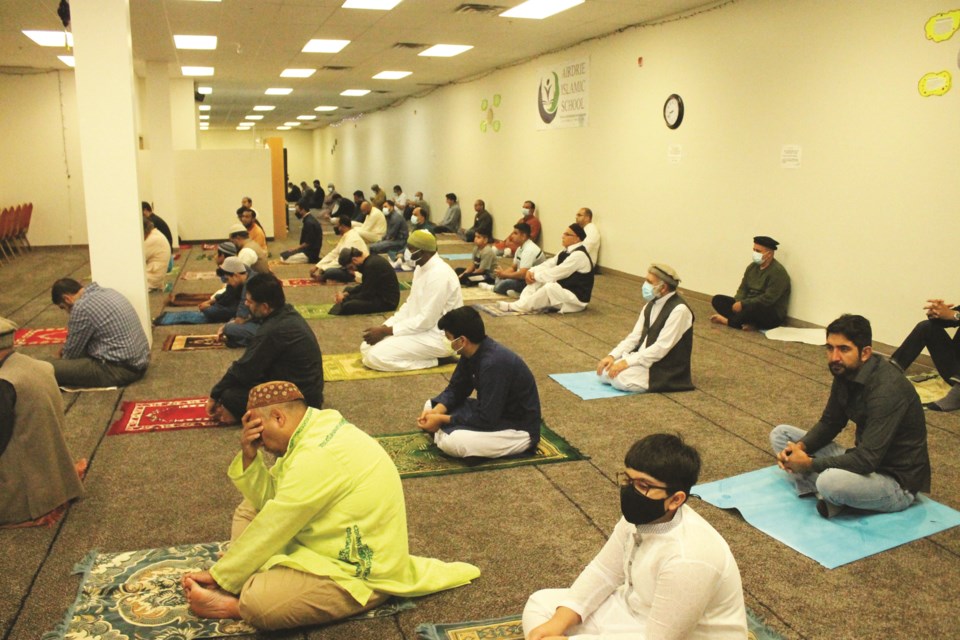Muslims in Airdrie returned to a more traditional way of celebrating one of Islam’s most important annual holidays this year, following two years of restrictions on public gatherings due to the COVID-19 pandemic.
July 8 to 12 marked the annual Islamic holiday of Eid al-Adha – the festival of sacrifice.
The holy day starts off with members performing a ritual prayer together, according to Dr. Hafiz Saeed from the Airdrie Islamic Centre (AIC). More people attended the prayer this year and celebrations went ahead inside people’s homes without cohorts or restrictions.
“It would have been like Eid would have been celebrated for pretty much my whole life, except for the last couple of years due to COVID-19,” Saeed said.
“During our prayers we typically stand in rows shoulder-to-shoulder, physically touching each other. We were doing that, which is our usual practice but in the midst of COVID-19, people were spacing and standing three feet apart and not physically touching each other.”
The Airdrie Islamic Centre has limited square footage, meaning attendance for the holiday celebrations had to decrease in 2020 and 2021.
Following the prayer on July 9 at AIC, people dispersed and gathered at the homes of family and friends for a celebration.
“Usually the day is characterized like any big celebration in the west, like Christmas – you go to friends or family's homes and spend time together, share meals, and gifts,” Saeed explained.
Sacrifice plays a big role in Eid-al-Adha and there are different ways people carry out that sacrifice, according to Saeed.
Some people will pay for the cost of an animal itself and donate its meat to those in need, while others slaughter an animal on their own farm or through a slaughter company where they can witness the sacrifice, he said.
This tradition comes from the sacrifice made by the Prophet Abraham as outlined in the Qur’an.
In the Islamic tradition, the Prophet Abraham was commanded through revelation to sacrifice his son, Saeed explained. When it came time to do the actual sacrifice, that order was amended due to his display of dedication and trust and he instead sacrificed a ram that was divinely provided to him.
“This is similar to the biblical tradition where the Prophet Abraham was commanded to sacrifice Isaac, but in the Islamic tradition he was actually commanded to sacrifice his son Ismail. It's the same message in either tradition, other than the son being chosen was different,” Saeed said.
Eid-al-Adha commemorates this sacrifice and Muslims reenact it to honour the founding fathers of the Abrahamic religions, Saeed said.
According to Sairah Khan from Airdrie's Ahmadiyya Muslim Women's Association, Eid-al-Adha was celebrated on July 9 and Ahmadiyya Muslims of Airdrie came together at the Town and Country Centre at 10 a.m. for prayers, wearing their finest clothes.
“Muslims all over the world on this Eid, remember the devotion, obedience and submission for the cause of Allah by Prophet Abraham and His son Prophet Ismail,” Khan said.
She added that this was the first time after COVID-19 that over 150 Airdrie Muslims came together for this celebration.
After Eid prayers, refreshments were served to all, and members enjoyed the rest of the day with their family and friends.
The feast day of sacrifice comes about ten weeks after Eid-ul-Fitr, and marks the completion of Hajj, the Islamic holy pilgrimage to Mecca in Saudi Arabia, Khan explained.
While many Muslims enjoy a feast day together, they spend some time praying for the safe journey of part of the Muslim community carrying out the pilgrimage, Saeed added.
Saeed noted the celebration shows the shared roots of Muslim, Christian, and Jewish traditions.
“We all believe in the common notion of sacrificing for God, we all believe in the common notion of following revealed scripture, and following prophetic examples. And again we all really honour a lot of the same historical figures,” Saeed said.



